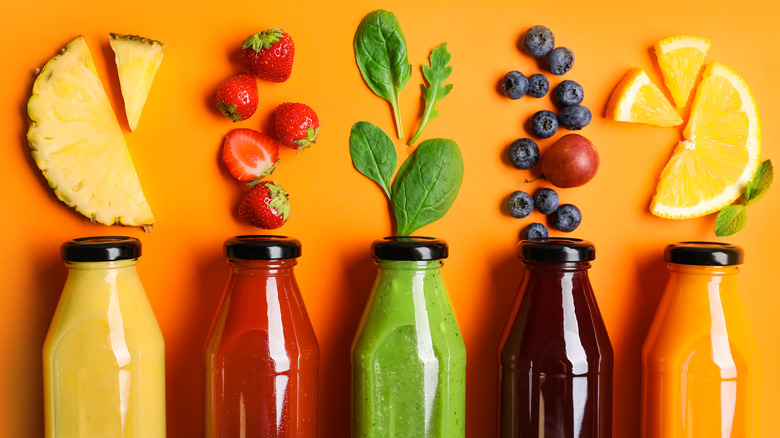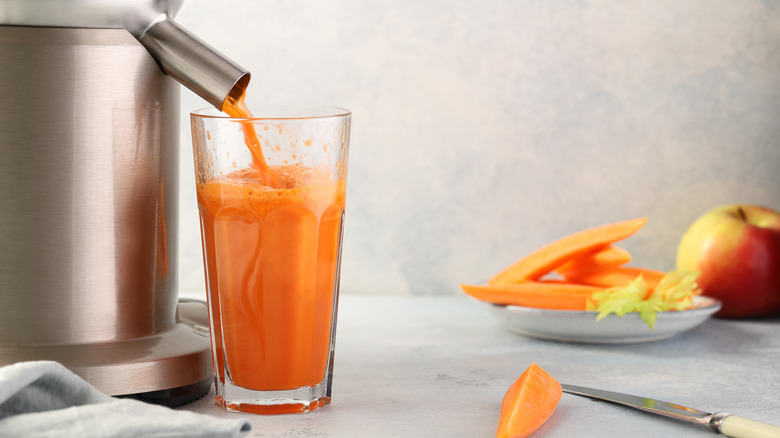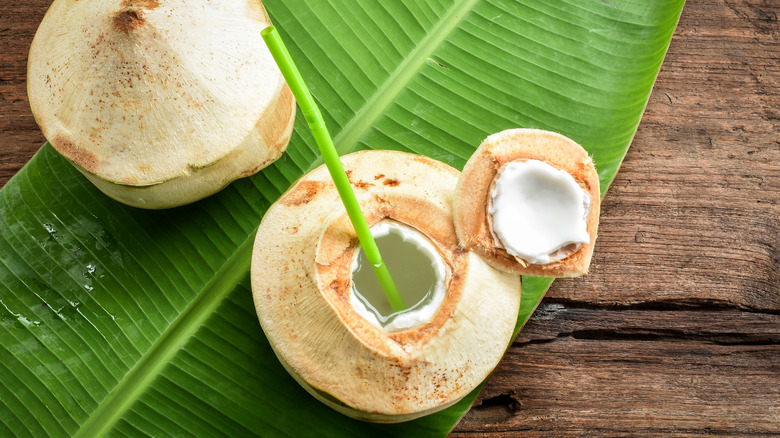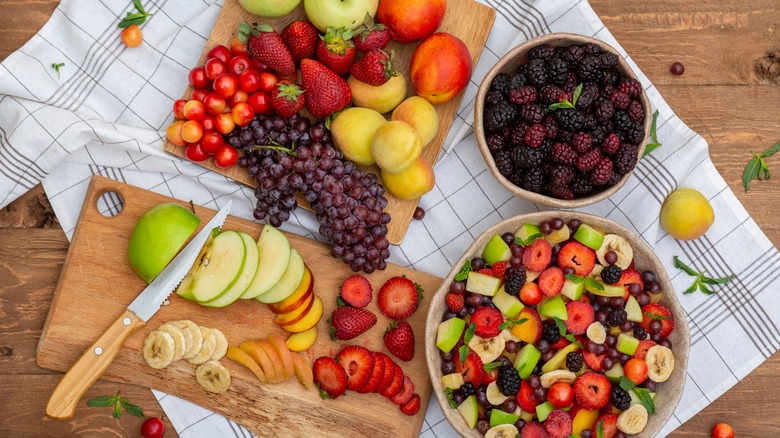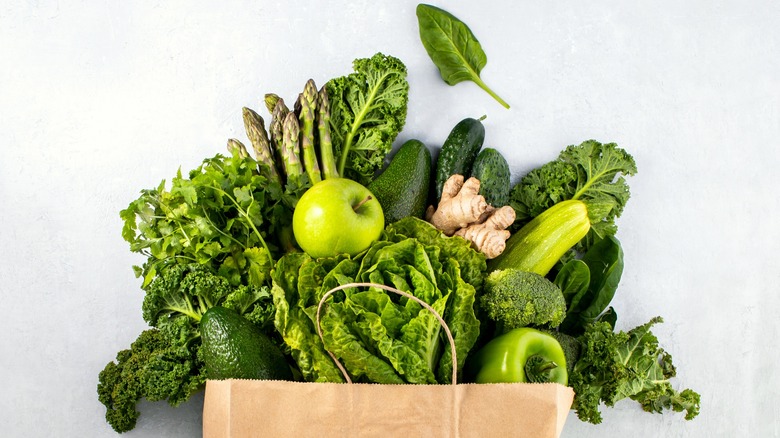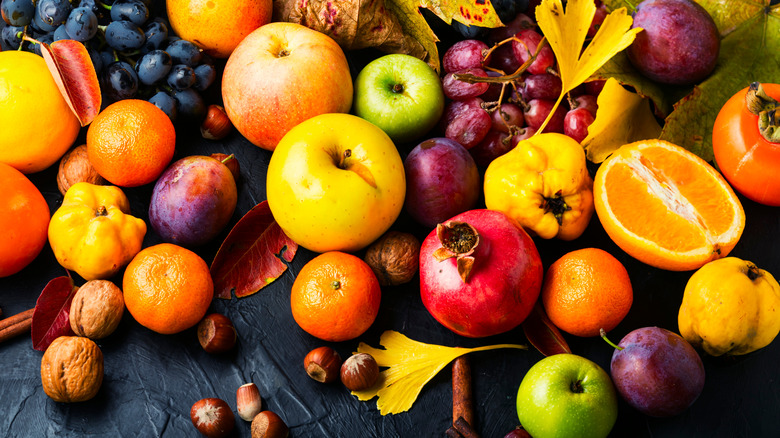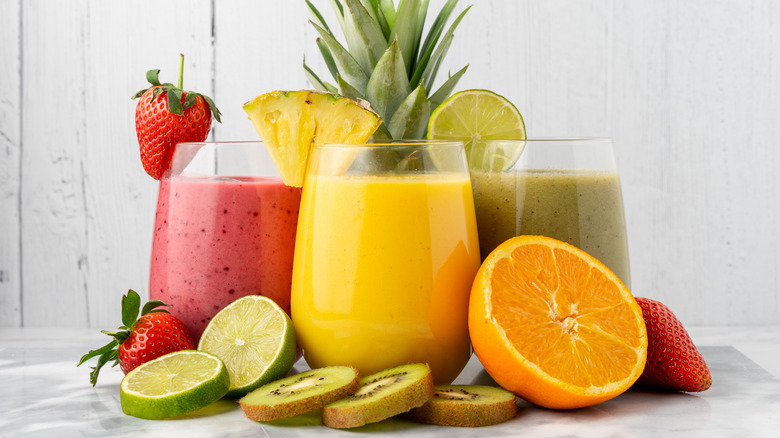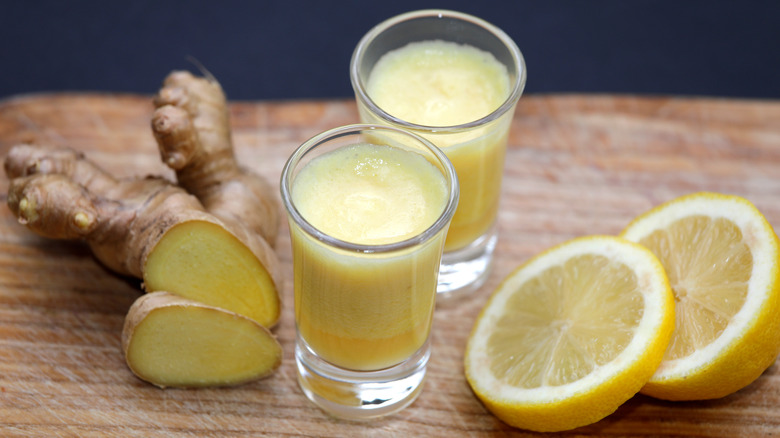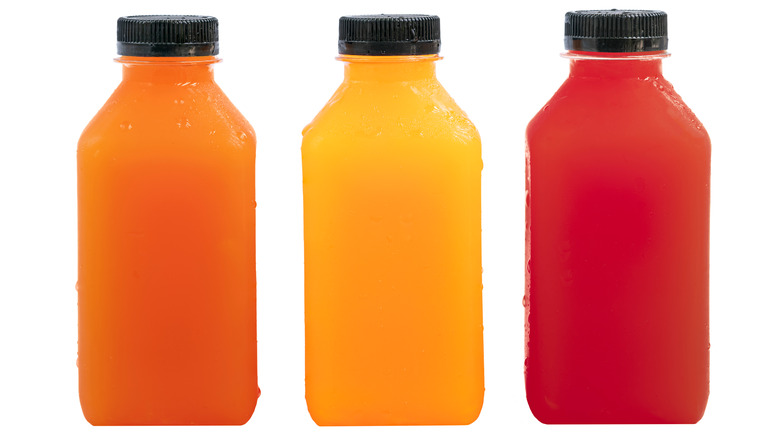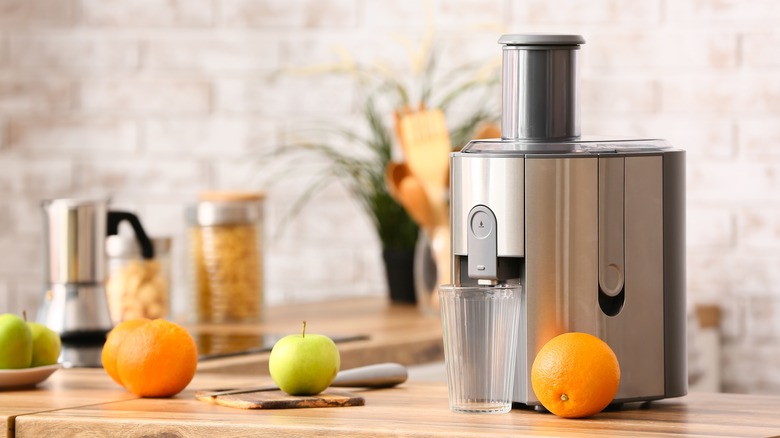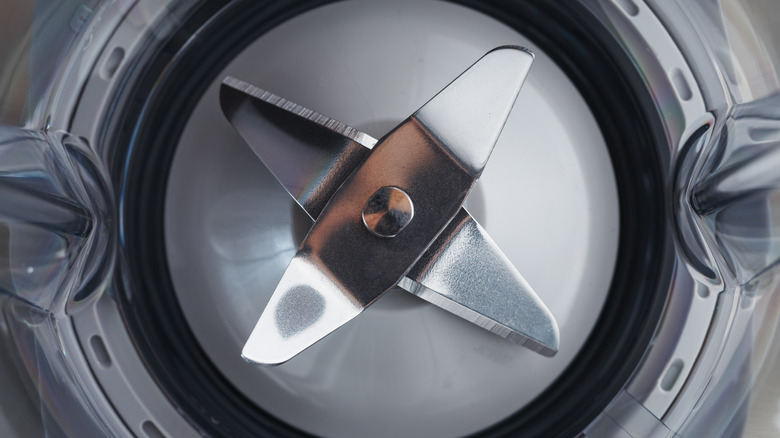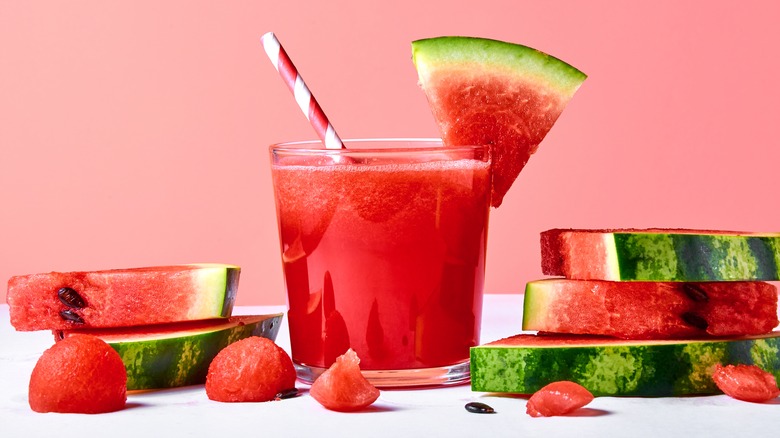11 Mistakes You're Making With Your Juicer
You don't need to be a health and wellness fanatic to be acquainted with juicing. If anything, most people have dabbled in it, whether during a juice cleanse, as part of a daily wellness regimen, or simply because fresh juice tastes nice. According to Juicernet, juicing fruits and vegetables is an ancient healing modality. However, it wasn't until the 1930s when Dr. Walker invented the first juicer that juicing as we know it began to spread across contemporary society. The original juicer relied on a hydraulic press and evolved into a range of centrifugal, masticating, large-scale commercial, and smaller home juicers by the 1950s.
In 2016, the New Jersey-based health and wellness food startup Juice Generation had a whopping 12,000 patrons passing through its store every day with annual sales worth $30 million, per Forbes. While the startup capitalized on rising health consciousness, it was also intent on redefining juice cleanses as a way of consuming nutrients while flushing impurities out of the body.
Fast-forward to 2025, and more and more people are exploring juicing. Whatever your reasons, read on to see the mistakes you might be making with your juicer, and what you can do to make it worth every press.
You're not considering the type of juicer you're using
The first aspect that has to be ironed out before you can get to the good part is the equipment. If you have minimal interest in juicing, you will have heard about centrifugal or masticating juicers. According to Juicers, there are several key differences between the two across three domains: operating speed, extraction method, and the quality of juice extracted. Centrifugal juicers operate at anywhere between 10,000 and 25,000 rotations per minute while masticating juicers are set at much slower speeds of 40 to 150 rotations per minute.
Unlike centrifugal juicers which typically use a cutting disc to grate fruits and vegetables into juice, masticating ones are more sophisticated. A large screw-like piece slowly rotates and pulls the produce downward under high levels of pressure, essentially squeezing the juice out. It then passes through a perforated mesh to separate the pulp. This process of masticating yields higher levels of vitamins and minerals, hence the juice is considered to be of superior quality and nutritional value. Ultimately though, there is no hard and fast rule about which is better besides considering your individual needs.
You're juicing produce that should not be juiced
When it comes to juicing, not all fruits are created equal. Regardless of the nutrients and minerals that the produce possesses, texture rules. According to Greatist, bananas, avocadoes, figs, rhubarb, mangoes, and coconuts should not be juiced. Bananas and avocadoes have a creamy consistency; granted they can turn an otherwise bland dish into an indulgent one, but this makes them somewhat of an enemy to your juicer. Similar to rhubarb, mango is quite fibrous, so you're better off consuming all that roughage fresh or in the form of a smoothie. Figs' unique texture will likely yield more of a fruit mash than juice, and coconut is just too tough. Besides, why try to juice coconut flesh when it does the work for you by providing coconut water while it's still young?
Some parts of fruits should also be avoided because they can actually be toxic. Per Medicine Net, rhubarb leaves and carrot tops can be toxic if juiced, while citrus peels can cause an upset stomach. Additionally, foods that are high in oxalic acid, like spinach, beets, rhubarb, and nuts, may not be suitable for juicing. This is especially important for people who have or are prone to developing kidney stones, as oxalic acid can contribute to their development when consumed in large amounts.
You're not considering organic produce
According to the U.S. Organic Industry Survey in 2020, the market for organic produce has grown exponentially over the last two decades, with consumer sales in the United States alone coming in at $56 billion. If you're interested in juicing, you've likely heard a lot about the benefits of choosing organic, but what does it actually entail? Organic produce is cultivated without artificial chemicals, antibiotics, hormones, and GMOs. When you purchase any product marked as organic, it is certified free from artificial additives.
However, just because you're eating organic foods, you aren't necessarily getting more nutrients, but you do get to avoid harmful stuff. Some fruits and vegetables that are not organic contain more pesticides than others; the worst are listed in the "Dirty Dozen" by the Environmental Working Group.
Commonly juiced fruits and vegetables, like apples, pears, celery, and spinach, are all on the list. Organic produce can be expensive though, so if you're not in a position to make a complete switch, your best bet is to ensure you're washing it well. Soaking fruits and vegetables in clean cold water and vinegar for five minutes before use is an easy step.
You're juicing too many greens
Are you really juicing if you're not having a cocktail of green vegetables on a daily basis? Green juice has gained quite the rep within health-conscious spaces, and lots of people are happy to scrunch their faces at the pungent flavors as they sip on the elixir. According to Healthline, improved digestive and immune functioning, weight loss, and lower levels of inflammation are just some of the benefits most green juice consumers can experience.
Although green vegetables may lower inflammation, support heart health and brain functioning, and act as a prebiotic thus aiding the digestive system, there are potential drawbacks to be aware of too. When greens are juiced, they lose some of their fiber content, decreasing a vital nutrient for healthy metabolic functioning.
Green juices are often layered with several fruits, and because too much of a good thing can still be unhealthy, excess sugar from the fruit may raise blood sugar levels. As previously noted, it can also increase oxalates, which can be dangerous for people with kidney diseases. Essentially, just because it's green doesn't mean the green light should remain perpetually lit. Moderation is key, as is juicing greens as part of an all-around balanced diet.
You're juicing too much fruit
Yes, there is such a thing as juicing too much. In particular, there are several reasons why you should consider the amount of fruit you're juicing, per BBC. Getting five a day is not only about the nutrients and minerals found in fruits; it's also about the fiber content that they provide to your daily intake. When juiced, the ability of fruits to offer fiber is immediately compromised. Then there's fructose; when you consume your fruits whole, the fructose takes longer to be absorbed into the bloodstream due to the fiber. Juicing strips it of this property, increasing susceptibility to those spikes you get from other sugary drinks like soda.
If you love your juice, you can alternate juicing with eating your food whole. Or better yet, make smoothies to ingest all the goodness that fruits have to offer. According to WebMD, a great place to start when picking out your fruits is with the color. The more colorful it is, the more of a nutrient punch it packs. For instance, you'll find that red, yellow, and orange fruits are particularly rich in antioxidants and vitamins A and C, green and white fruits are great for vitamin K and potassium, respectively, while blue and purple fruits assist with preventing major diseases like cancer and heart-related issues.
You're not drinking the juice fresh
If you've wondered whether it's best to drink your juice as soon as it comes out of the juicer, the short answer is yes. According to Livestrong, unlike store-bought juices that are pasteurized to eliminate bacteria, freshly made juice is vulnerable to harmful bacterial growth. Unfortunately, the longer you let it sit — even in the refrigerator — the greater the risk.
As such, there are several factors that you should keep in mind when consuming freshly squeezed juice, whether in your own home, at markets, juice bars, or restaurants. If you're juicing your own, you can make enough for a single serving by knowing the general fruit-to-juice ratios of your preferred produce. For instance, you would need about four medium oranges to make one cup of orange juice, one pound of carrots for a cup of carrot juice, and so on. If you absolutely cannot avoid leftover juice, you can also pour it into an ice cube tray and freeze it for later. Meanwhile, if you're out and about and see freshly squeezed juice on offer sitting on a cafe counter, you're best avoiding it altogether.
The juice is not cold pressed
We touched upon centrifugal and masticating juicers, but cold pressed is another element that is all the rage. This method is typically made using the same principle masticating juicers employ. We know that this process generally yields higher-quality juice with an elevated nutrient profile, but what does this look like? According to CircleDNA, cold-pressed juices typically boast significant levels of vitamins A, B, C, and K, as well as folate and potassium.
Vitamin A is especially good for eyesight and the health of your largest organ — your skin. Vitamin B aids with focus and a positive mood, and like vitamin C, assists with immune functioning. Meanwhile, Vitamin K supports the body's ability to heal wounds through blood clotting, while folate and potassium support cell development and cardiovascular health, respectively. Ultimately, even though cold-pressed juice is packed with nutrients, moderation is ideal and it's important to enjoy a variety of foods.
You're storing your juice in a plastic container
You've hosted brunch and made enough fresh juice for a large group, but people mostly drank coffee and now you're stuck with more leftover juice than your ice trays can hold. Sometimes you end up having to store juice to prevent waste. In these circumstances, plastic must be avoided. According to The New York Times, phthalates and bisphenols are some of the most concerning chemicals found in plastics, as ongoing research has linked them to endocrine disruption. This essentially means that they mess with hormones in the body, which can have a negative impact on a myriad of physical and behavioral functions in both children and adults.
Additionally, bisphenols are commonly found in water bottles, juice bottles, and food containers. As such, it's imperative to opt for alternative storage. Per House Grail, the first aspect to consider when storing juice is the type of juicer you've used. If it's centrifugal, you should keep the juice refrigerated for only 24 hours, whereas you can stretch it to 72 hours if you've used a masticating juicer. Pour the juice into glass bottles and lower the rate of oxidation by adding some lemon juice and filling the containers to the brim to mimic a vacuum seal.
You're not cleaning your juicer after every use
Nobody ever looks forward to cleaning up the mess they've created in the kitchen. But even if you avoid clearing the counters and all the extras that come with juicing, you shouldn't neglect cleaning your juicer after every use. Yes, every single one. According to Tech Radar, it is vital that you disassemble the juicer parts involved in the actual juicing. Pop them into the dishwasher if the appliance manual confirms you can. If not, give the parts a scrub with a brush using warm soapy water followed by a thorough rinse. Be sure to let the parts fully dry before reassembling the juicer.
If you've left your juicer sit before mustering the energy to give it a clean, switch it on and run some water through the feeder. You can also use the drip stop to collect water and give it time to lift the dry fibers and pulp. If you've waited too long and the remains have completely dried, it's best not to switch the juicer on as anything stuck could damage it. Instead, take it apart and allow everything to soak in warm soapy water before you give it a good scrub.
You're not caring for your juicer's blades
You've done the work to ensure you're using the correct produce for high-quality nutritional juice. You're storing it appropriately if necessary and cleaning your juicer as regularly as you use it. All that remains is to make sure that you're taking good care of the appliance's blades. Per Juicernet, while the blades will generally last for a couple of months, their lifespan is mostly determined by the kind of juicer you have and the frequency of use. The fruits and vegetables you use will also have bearing on the blades' lifespan; softer fresh produce lengthens it, whereas blades will wear quickly if you mostly opt for harder fruits and vegetables.
The best way to care for the blades comes down to cleaning them regularly and using the correct type for the size and produce you're juicing. Of course, wear and tear is part of using any equipment, so it's important to know whether your specific blades can be sharpened or need to be replaced entirely — and then to follow through.
You're not reviewing both the pros and cons of juicing
When all is said and done, you might conclude that juicing is not for you. Sure, many people share the benefits they have reaped from juicing. However, the drawbacks may not be as widely visible, especially if you're not explicitly seeking them out. Unfortunately, according to Everyday Health, there are several cons to be aware of about juicing.
Some juices can be dangerous when consumed with certain medications; for instance, grapefruit juice can heighten the effects of medications like antihistamines. Meanwhile, if you're using juicing as a meal replacement method, you could end up undernourished. If you're already prediabetic, you could increase your risk of developing Type 2 diabetes due to the high sugar content in fruit, not to mention potential weight gain. Additionally, you may be getting less fiber and protein than your body needs, increasing your risk of blood sugar spikes and crashes.
As previously noted, juicing is great in moderation and as part of an overall balanced diet. What it will not do, is act as a nourishing replacement for all the goodness that other foods have to offer.
